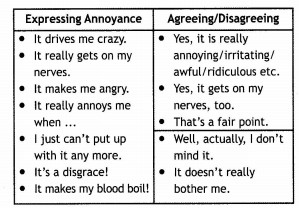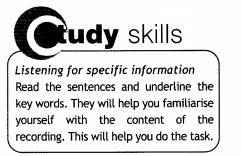|
Гипермаркет знаний>>Английский язык>>Английский язык 11 класс>> 5b Listening & Speaking Skills

Vocabulary
Problems in neighbourhoods
1 Check these phrases in the Word List. Which of these problems can you see in the pictures?
rubbish on the streets lack of parks/trees
heavy traffic on the roads
street hawkers stray animals
overcrowded public transport
smelts and noise graffiti
beggars dog/bird mess
cars/motorbikes parked on the pavements
Are there similar problems where you live?
2 Listen to three people talking about things they find annoying in the place they live. What is each person's problem?

Idioms
3 Fill in: sink, path, drain, roof. Check in the Word List. Are there similar idioms in your language?
1 This house is in a very bad state, but at least we have a.........over our heads.
2 Look how big her suitcase is! She's taking everything but the kitchen.............
3 He lied about giving me my money back. He really led me up the garden............!
4 He wastes all the money you give him. It's like throwing money down the..........
Everyday English
Expressing annoyance
4 a Listen again. Which of the phrases in the table did they use to express their annoyance?


b Use the following ideas to discuss, as in the example.
1 You see someone dropping litter on the pavement.
> A: it really gets on my nerves when people drop titter on the pavement.
B: Yes, it gets on my nerves, too. Why can't they use the bins?
2 Your neighbour's dog has fouled in front of your house.
3 You walk past an alley that stinks of rubbish.
4 You have been asked to buy a pirate CD/DVD while you are at a cafe.
5 You are on a busy bus/train squashed up against other people.
Reading
5 a Read the first two exchanges in the dialogue. Where does the conversation take place? What do you think Bob wants?
Listen and read to check.
Bob: Can I have a word with you for a minute, please?
Tom: Sure. What is it?
Bob: Well, it's about your rubbish bin actually.
Tom: What's the problem?
Bob: Well, I'm sorry to say this, but it stinks and I just can't put up with it any more.
Tom: It's full of rubbish! What do you expect?
Bob: You could put your rubbish in a bag first; so it smells less. That's what I do.
Tom: But bin bags cost money! It doesn't cost me anything to throw my rubbish straight into the bin.
Bob: Yes. I appreciate that, but the smell is offensive and very annoying. It drives me crazy!
Tom: I see. Sorry about that.
Bob: Also, the smell attracts flies and other insects, so it could become a health risk.
Tom: That's a fair point. OK. I'll use bin bags from now on.
Bob: Thanks.
b Read the dialogue again and answer the questions.
1 What is annoying Bob?
2 What is Tom's reaction to Bob's complaint?
3 What does Bob suggest as a solution?
4 What is Tom's first reaction to Bob's suggestion?
5 How does Bob persuade Tom to do what he wants?
Speaking
6 Portfolio: Work in pairs. Your neighbour's dog is keeping you awake at night. Act out a dialogue using phrases from Ex. 4. You can use the dialogue in Ex. 5 as a model.
Listening

7 RNE You will hear a conversation between two neighbours. Listen and choose the correct answer for each question.
1 Jack has just moved in.
A True B False C Not stated
2 Jane hasn't finished unpacking yet.
A True B False C Not stated
3 This is Jane's first home of her own.
A True B False C Not stated
4 Jane hasn't got a car.
A True B False C Not stated
5 Jane has been driving a long time.
A True B False C Not stated
6 Jane will buy a parking permit.
A True B False C Not stated
7 The Greens own a dog.
A True B False C Not stated
Say it right
Exclamations
8 a Match the interjections to the statements. Listen and check.
1 Phew!
2 Er ...
3 Oh!
4 Yuk!
5 Oi!
a That's annoying!
b Stop that!
c That's disgusting!
d What a relief!
e I don't know.
b Use the interjections to complete the exchanges.
1 A: ................
B: I know. It smells awful, doesn't it?
2 A: I thought that car was going to hit us!
B: So did I
3 A: When's the next bus into town?
B: ..........
4 A: Look! That boy is throwing his rubbish on the pavement.
B:........Put it in the bin!
5 A: There are roadworks in the high street again.
B: That means more delays!
9 Think of ten new words/expressions you have learnt in this lesson. Make sentences using them.
Английский язык. 11 класс : учеб. для общеобразоват. учреждений / [О.В. Афанасьева, Дж.Дули, И.В. Михеева и др.]. - 2-е изд., доп. и перераб. - М.: Express Publishing : Просвещение, 2009. - 244 с. : ил. - (Английский в фокусе).
Рефераты, домашняя работа по английскому языку скачать, учебники скатать бесплатно, онлайн уроки, вопросы и ответы
Содержание урока
 конспект урока конспект урока
 опорный каркас опорный каркас
 презентация урока презентация урока
 акселеративные методы акселеративные методы
 интерактивные технологии
Практика интерактивные технологии
Практика
 задачи и упражнения задачи и упражнения
 самопроверка самопроверка
 практикумы, тренинги, кейсы, квесты практикумы, тренинги, кейсы, квесты
 домашние задания домашние задания
 дискуссионные вопросы дискуссионные вопросы
 риторические вопросы от учеников
Иллюстрации риторические вопросы от учеников
Иллюстрации
 аудио-, видеоклипы и мультимедиа аудио-, видеоклипы и мультимедиа
 фотографии, картинки фотографии, картинки
 графики, таблицы, схемы графики, таблицы, схемы
 юмор, анекдоты, приколы, комиксы юмор, анекдоты, приколы, комиксы
 притчи, поговорки, кроссворды, цитаты
Дополнения притчи, поговорки, кроссворды, цитаты
Дополнения
 рефераты рефераты
 статьи статьи
 фишки для любознательных фишки для любознательных
 шпаргалки шпаргалки
 учебники основные и дополнительные учебники основные и дополнительные
 словарь терминов словарь терминов
 прочие
Совершенствование учебников и уроков прочие
Совершенствование учебников и уроков
 исправление ошибок в учебнике исправление ошибок в учебнике
 обновление фрагмента в учебнике обновление фрагмента в учебнике
 элементы новаторства на уроке элементы новаторства на уроке
 замена устаревших знаний новыми
Только для учителей замена устаревших знаний новыми
Только для учителей
 идеальные уроки идеальные уроки
 календарный план на год календарный план на год
 методические рекомендации методические рекомендации
 программы программы
 обсуждения
Интегрированные уроки обсуждения
Интегрированные уроки
Если у вас есть исправления или предложения к данному уроку, напишите нам.
Если вы хотите увидеть другие корректировки и пожелания к урокам, смотрите здесь - Образовательный форум.
|















